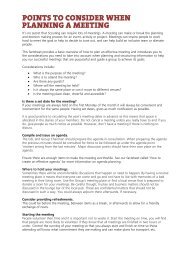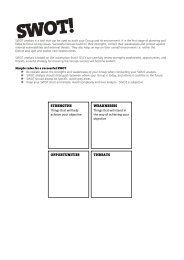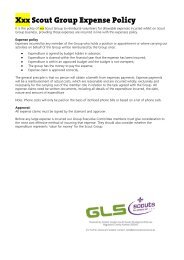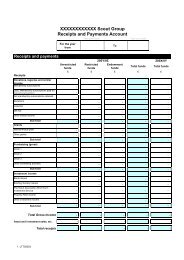the group executive committee - Greater London South Scouts ...
the group executive committee - Greater London South Scouts ...
the group executive committee - Greater London South Scouts ...
Create successful ePaper yourself
Turn your PDF publications into a flip-book with our unique Google optimized e-Paper software.
For fur<strong>the</strong>r information, advice and support contact:<br />
Matt Butterfield<br />
County Development Officer<br />
E: matt.butterfield@gls-scouts.org.uk<br />
T: 07766 540 057<br />
<strong>Greater</strong> <strong>London</strong> <strong>South</strong> Scout County registered charity no. 303883<br />
gls-scouts.org.uk glscountyscouts.org.uk<br />
1 st edition January 2012<br />
Compiled, designed and edited by Matt Butterfield
WELCOME<br />
Thank you for agreeing to become a member of our Scout Group’s Executive Committee. Your skills,<br />
energy and input will help to make a difference to our Group.<br />
Who are we?<br />
Although <strong>the</strong> 'Executive' bit in our title makes us sound very formal and important, it is actually not<br />
like that at all! Our <strong>committee</strong> is made up of <strong>the</strong> parents of children from within our Scout Group.<br />
Like most <strong>committee</strong>s we have a Chairman, Treasurer and Secretary and we aim to have a parent<br />
from each section in <strong>the</strong> Group on <strong>the</strong> Executive Committee. This means that we have a good spread<br />
of opinion and all <strong>the</strong> sections are represented. We very much believe that many hands make light<br />
work and that no one person should ever have to do too much!<br />
Our meetings are very informal and we enjoy chatting about <strong>the</strong> things going on in <strong>the</strong> Group and<br />
making <strong>the</strong> right decision to support <strong>the</strong> work of our leaders.<br />
As a member of our Group Executive you help ensure that <strong>the</strong> Group fulfils <strong>the</strong> aims of The Scout<br />
Association and help make decisions regarding our Groups property, finances and <strong>the</strong> support we<br />
provide to our Leaders.<br />
By becoming a member of our Group Executive Committee you become one of our trustees. Without<br />
good and committed trustees, no charity can hope to succeed. Our Executive Committee Members<br />
can often be <strong>the</strong> invisible volunteers in Scouting but <strong>the</strong>y are responsible for <strong>the</strong> management and<br />
governance of Scouting in our Group and play an important part in helping to make Scouting<br />
happen.<br />
It might not be <strong>the</strong> most glamorous or visible role – but that doesn’t make it any less essential. This<br />
guide is designed to help you in your role as a member of our Group Executive Committee. It should<br />
not be seen as a technical guide, but should point you in <strong>the</strong> right direction when getting started in<br />
<strong>the</strong> role. If you are new to Scouting or <strong>the</strong> role you may find it useful to read <strong>the</strong> ‘Understanding<br />
Scouting language’ section at <strong>the</strong> back of this guide first.
THE GROUP EXECUTIVE COMMITTEE<br />
The Group Executive Committee’s role is to support <strong>the</strong> Group Scout Leader and ensure <strong>the</strong> effective<br />
administration of <strong>the</strong> Scout Group.<br />
The Committee aims to make sure that our Scout Group has <strong>the</strong> facilities and resources needed to<br />
deliver good Scouting in <strong>the</strong> Group. This includes:<br />
• <strong>the</strong> maintenance of <strong>the</strong> Group’s property and equipment,<br />
• <strong>the</strong> raising of funds and <strong>the</strong> administration of <strong>the</strong> Group’s finance,<br />
• <strong>the</strong> insurance of persons, property and equipment,<br />
• Group public occasions,<br />
• assisting with <strong>the</strong> recruitment of Leaders and o<strong>the</strong>r adult support/<br />
Members of <strong>the</strong> Group Executive Committee<br />
The Group Executive Committee is made-up of people from four different areas.<br />
• ex-officio members - Some people are members because of <strong>the</strong>ir role in Scouting, <strong>the</strong>se are:<br />
• Group Scout Leader,<br />
• Group Chair,<br />
• Group Treasurer,<br />
• Group Secretary,<br />
• Assistant Group Scout Leader (if any),<br />
• All Section Leaders (i.e. individuals holding a Beaver Scout Leader, Cub Scout Leader or<br />
Scout Leader role) subject to that Section Leader expressly indicating to <strong>the</strong> AGM (in<br />
writing or orally at <strong>the</strong> meeting) that <strong>the</strong>y are willing to perform such a function,<br />
• Explorer Scout Leader (if stated in <strong>the</strong> partnership agreement) and subject to that<br />
Explorer Scout Leader expressly indicating to <strong>the</strong> AGM (in writing or orally at <strong>the</strong> meeting)<br />
that <strong>the</strong>y are willing to perform such a function,<br />
• The sponsoring authority or its nominee (if applicable),<br />
The District Commissioner and <strong>the</strong> District Chairman have <strong>the</strong> right of attendance at meetings of <strong>the</strong><br />
Group Executive Committee.<br />
• elected members – <strong>the</strong>se are elected by <strong>the</strong> Group Council at <strong>the</strong> Annual General Meeting<br />
and <strong>the</strong>re are normally four to six of <strong>the</strong>m;<br />
• nominated members – <strong>the</strong>se are nominated by <strong>the</strong> Group Scout Leader in consultation with<br />
<strong>the</strong> Group Chairman at <strong>the</strong> Annual General Meeting and <strong>the</strong>re must be no more than <strong>the</strong><br />
number of elected members<br />
• co-opted members – <strong>the</strong>se are chosen annually by <strong>the</strong> Group Executive Committee for <strong>the</strong>ir<br />
skills to be on <strong>the</strong> <strong>committee</strong> and <strong>the</strong>re must be no more than <strong>the</strong> number of elected<br />
members.<br />
Ideally, between <strong>the</strong> nominated members, elected members and co-opted members, <strong>the</strong> Group<br />
Executive Committee should include a parent of at least one Member from each of <strong>the</strong> sections in <strong>the</strong><br />
Group.<br />
The Group constitution covers <strong>the</strong> membership of <strong>the</strong> Group Executive Committee in detail and can<br />
be found later on in this guide. The membership is set up this way to ensure that <strong>the</strong> interests of <strong>the</strong><br />
Group Council and <strong>the</strong> Group Scout Leader are represented, and balanced. It also serves to broaden<br />
<strong>the</strong> membership of <strong>the</strong> Executive – possibly to bring in people from o<strong>the</strong>r parts of <strong>the</strong> local<br />
community.<br />
The co-opted members are often used to bring particular skills into <strong>the</strong> Executive Committee, perhaps<br />
because of a particular project that is being undertaken or problem that is being tackled.
CHARITY TRUSTEES<br />
The Group Executive Committee has an ongoing and personal responsibility to act responsibly on<br />
behalf of <strong>the</strong> Scout Group. They must not, for example, decide to take a chance and save money by<br />
not insuring Group property. The Policy, Organisation & Rules of The Scout Association (POR), sets<br />
out <strong>the</strong> details and must be referred to.<br />
All members of <strong>the</strong> Group Executive Committee are <strong>the</strong> charity trustees of <strong>the</strong> Scout Group. As such<br />
<strong>the</strong>y are responsible for complying with all <strong>the</strong> legislation applicable to charities. As a member of <strong>the</strong><br />
Committee it is important that you are aware of <strong>the</strong>se responsibilities.<br />
Charity trustees are responsible for carrying out <strong>the</strong>ir role with due regard to <strong>the</strong> purpose of <strong>the</strong><br />
charity and acting as a reasonable person. Trustees can, in some circumstances, be liable for financial<br />
loss incurred by <strong>the</strong> charity and must <strong>the</strong>refore consider <strong>the</strong>ir decisions very carefully. Trustees are<br />
unlikely to be liable if <strong>the</strong>y: act reasonably; work within <strong>the</strong> governing document (in our case “Policy,<br />
Organisation and Rules of The Scout Association”) and take proper and appropriate advice when<br />
<strong>the</strong>y don’t know enough to make <strong>the</strong> decision or are required to do so by law.<br />
There are also some excellent documents available without charge from <strong>the</strong> Charity Commission to<br />
support you (<strong>the</strong> Charity Commission is <strong>the</strong> body responsible for regulating <strong>the</strong> work of charities in<br />
England and Wales). It has an excellent website (www.charity-commission.gov.uk) where you can<br />
download some useful documents.<br />
Who can be a trustee?<br />
Trustees come from all walks of life and generally <strong>the</strong> wider range of people we can have<br />
represented on our Executive Committee, <strong>the</strong> better. However <strong>the</strong>re are some people who are not<br />
able to serve as trustees. If you answer 'yes' to any of <strong>the</strong> following you will not be eligible:<br />
• under 18 years of age<br />
• convicted of an offence involving deception or dishonesty, unless <strong>the</strong> conviction is spent,<br />
• an undischarged bankrupt,<br />
• previously been removed from trusteeship of a charity by <strong>the</strong> court or Charity Commission.<br />
• under a disqualification order under <strong>the</strong> Company Directors Disqualification Act 1986<br />
Responsibilities of trustees<br />
Trustees:<br />
• Ensure compliance with charity law and <strong>the</strong> requirements of <strong>the</strong> Charities Commission,<br />
• have ultimate responsibility for <strong>the</strong> work of <strong>the</strong> charity (our Scout Group),<br />
• must act in <strong>the</strong> best interests of <strong>the</strong> Group,<br />
• take decisions about <strong>the</strong> future of <strong>the</strong> Group,<br />
• ensure <strong>the</strong> Group remains sustainable,<br />
• consider likely future challenges and prepare <strong>the</strong> Group to face <strong>the</strong>m,<br />
• ensure <strong>the</strong> Group is working within <strong>the</strong> law,<br />
• be accountable for <strong>the</strong> Group,<br />
• support <strong>the</strong> Group Scout Leader,<br />
• monitor to ensure <strong>the</strong> Group is meeting its objectives,<br />
• ensure <strong>the</strong> Committee is working effectively and efficiently.<br />
The role can be very challenging but it can also be extremely interesting and rewarding. Taking on<br />
this responsibility can give you <strong>the</strong> chance to exercise your existing skills and develop new ones.<br />
Please note: Anyone disqualified under section 72 of <strong>the</strong> Charities Act 1993 because of bankruptcy or<br />
conviction for an offence of dishonesty or deception cannot become a charity trustee.
The Charity Commission provides useful supporting information to help explain <strong>the</strong> role of a charity<br />
trustee. You might consider obtaining (from www.charity-commission.gov.uk) <strong>the</strong> following useful<br />
publications:<br />
• CC3 – The essential trustee: what you need to know<br />
• CC3a – The essential trustee: an introduction<br />
These resources clarify what <strong>the</strong> charity trustee must know, <strong>the</strong> responsibilities placed upon <strong>the</strong>m and<br />
<strong>the</strong>ir commitment to acting properly.
MEMBERSHIP OF THE SCOUT ASSOCIATION<br />
There are two types of membership of The Scout Association – Member or Associate Member.<br />
Members:<br />
Young people who join a section, make <strong>the</strong> Scout Promise and become Members of The Scout<br />
Association. Adults who, by choice or because of <strong>the</strong> requirements of <strong>the</strong>ir appointment, become<br />
Members of The Scout Association, make <strong>the</strong> Scout Promise and pay a membership subscription.<br />
Associate members:<br />
Some adults may choose to become Associate Members. This involves signing a declaration, paying<br />
<strong>the</strong> membership subscription but not having to make <strong>the</strong> Scout Promise.<br />
Adults in Scouting<br />
Most adults in Scouting will hold an appointment, which means <strong>the</strong>y have a defined role that <strong>the</strong>y<br />
have been appointed to. Their role will be recognised by an appointment card. Group appointments<br />
are approved by <strong>the</strong> Scout District.<br />
Group Chairmen, Group Secretaries, Group Treasurers and o<strong>the</strong>r members of <strong>the</strong> Group Executive<br />
Committee, including Group Supporters, are not required to be Members of The Scout Association<br />
but are encouraged to consider <strong>the</strong>ir options. They could become Members or Associate Members.<br />
Trustee Indemnity Insurance<br />
As a result of a change in Charity Commission rules (which, until June 2007, precluded <strong>Scouts</strong> from<br />
buying a Trustee Indemnity Insurance policy), cover can now legally be purchased.<br />
Broadly, a Trustee Indemnity Insurance policy is designed to cover Trustees in <strong>the</strong> event that <strong>the</strong>y are<br />
held personally liable for <strong>the</strong> loss of charity assets or for making a decision which results in <strong>the</strong> charity<br />
sustaining a loss in financial terms. It does not cover acts which <strong>the</strong> trustee knew (or should<br />
reasonably have known), would constitute a breach of trust, so deliberate malfeasance would not be<br />
covered.<br />
Having considered <strong>the</strong> merits of such cover, The Scout Association elected to arrange a national<br />
policy to cover trustees of any Scout charity. That includes members of <strong>executive</strong> <strong>committee</strong>s of Scout<br />
Districts, Counties and Groups, as well as those who manage o<strong>the</strong>r Scout assets such as building or<br />
campsite <strong>committee</strong>s.<br />
The provision of cover is designed to protect people who, having acted responsibly and honestly, find<br />
<strong>the</strong>mselves being held to account. An obvious example might be where <strong>the</strong>y have sent a cheque to<br />
pay for insurance, it is mislaid in <strong>the</strong> post and an uninsured loss occurs.<br />
The premium is paid centrally by The Scout Association on behalf of all UK Groups, and as such, <strong>the</strong>y<br />
have set a limit of indemnity <strong>the</strong>y see adequate for <strong>the</strong> membership, so no additional cover need be<br />
purchased.<br />
Who is covered?<br />
Any person elected, co opted or appointed to act as a trustee to Scout assets (<strong>the</strong>se will usually be<br />
<strong>the</strong> members of an Executive Committee).<br />
What are <strong>the</strong>y covered for?<br />
Personal liability to make good a loss to <strong>the</strong> charity caused by <strong>the</strong>ir joint or several action.<br />
What is not covered?<br />
Criminal actions and acts which <strong>the</strong> trustee(s) knew (or should reasonably have known) could result in<br />
a breach of trust. Acts taken in reckless disregard of whe<strong>the</strong>r a breach of trust might occur or not.
YOUR ROLE AS A MEMBER OF<br />
THE GROUP EXECUTIVE COMMITTEE<br />
There are a wide variety of roles which need to be undertaken in any Scout Group. Some are as part<br />
of <strong>the</strong> Group’s Committee structure, and o<strong>the</strong>rs involve much more practical tasks.<br />
As a member of <strong>the</strong> Group Executive Committee you will attend <strong>the</strong> Committee meetings and where<br />
possible assist with <strong>the</strong> work of <strong>the</strong> Committee. This could be by taking part in <strong>the</strong> general<br />
discussions and decision making process of <strong>the</strong> Committee, by specifically delegated responsibilities<br />
given to you as a role holder or by being part of a sub-Committee. All of <strong>the</strong> tasks undertaken my<br />
members of <strong>the</strong> Group Executive Committee need to ensure that <strong>the</strong> Group can provide great quality<br />
Scouting for our young people both now and in <strong>the</strong> future.<br />
What are you a member of?<br />
You are a member of a Scout Group, and are more than likely an existing member of <strong>the</strong> Group<br />
Scout Council. The Group Scout Council is <strong>the</strong> electoral body which supports Scouting in <strong>the</strong> Scout<br />
Group.<br />
The Group Executive Committee is accountable to <strong>the</strong> Group Scout Council. In reality <strong>the</strong> Group<br />
Scout Council meets just once a year. This meeting, <strong>the</strong> Annual General Meeting, must be held within<br />
six months of <strong>the</strong> Group’s financial year end. The Group Scout Council receives annual reports and<br />
sets up <strong>the</strong> Group Executive Committee for <strong>the</strong> following year.<br />
Membership of <strong>the</strong> Group Scout Council is open to all adults with appointments in <strong>the</strong> Group, as well<br />
as <strong>the</strong> parents of youth members in <strong>the</strong> Group, and Patrol Leaders. O<strong>the</strong>r supporters, including<br />
former <strong>Scouts</strong> and <strong>the</strong>ir parents, may be admitted to <strong>the</strong> Group Scout Council. It is possible, in fact<br />
highly desirable, to include all of those who support <strong>the</strong> Group.
How does <strong>the</strong> Scout Group work?<br />
The Group Scout Leader is <strong>the</strong> lead volunteer manager of <strong>the</strong> Scout Group. They are responsible for<br />
providing leadership and support to every adult and young person involved in <strong>the</strong> Group. They work<br />
with <strong>the</strong> Group Chairman to ensure <strong>the</strong> effective running and administration of <strong>the</strong> Scout Group.<br />
The Group Chairman and <strong>the</strong> Group Executive Committee support <strong>the</strong> Group Scout Leader and<br />
ensure <strong>the</strong> effective administration of <strong>the</strong> Scout Group. The Group Scout Leader nominates <strong>the</strong><br />
Group Chairman and <strong>the</strong> relationship should be one of partnership and mutual support.<br />
The leaders in <strong>the</strong> Group work with <strong>the</strong>ir team of adults (who perform a variety of roles), to deliver<br />
an exciting and attractive programme of activities for young people in <strong>the</strong> Group. Their work is<br />
coordinated through <strong>the</strong> Group Scouters’ meeting (chaired by <strong>the</strong> Group Scout Leader), which<br />
includes <strong>the</strong> Section Leaders and Assistant Section Leaders.<br />
The Scout District<br />
Your Scout Group is part of a Scout District, which provides support to a number of Scout Groups<br />
and encourages <strong>the</strong>m to work toge<strong>the</strong>r. The District is managed by a District Commissioner (DC).<br />
They are like to be supported by a team of Assistant District Commissioners (ADCs). They will often<br />
hold a specific appointment such as ADC (Cub <strong>Scouts</strong>), with responsibility to develop this particular<br />
area of Scouting across <strong>the</strong> District.<br />
The Scout County<br />
Your Scout District and Group will also be part of a Scout County, which is managed by a County<br />
Commissioner (CC) and <strong>the</strong>y are likely to be supported by <strong>the</strong> County.<br />
Scout Active Support<br />
Scout Active Support Units are based in Scout Groups, Districts and Counties and are made up of a<br />
team of adults that provide direct support to Scouting locally.
WHO CAN HELP YOU GET STARTED?<br />
- YOUR KEY COLLEAGUES<br />
The Group Chairman<br />
The Group Chairman is nominated by <strong>the</strong> Group Scout Leader to:<br />
• work closely with and support <strong>the</strong> Group Scout Leader,<br />
• lead <strong>the</strong> Group Executive Committee, to provide sound administrative and financial<br />
support to <strong>the</strong> Group<br />
• maintain and develop <strong>the</strong> Group as part of <strong>the</strong> community,<br />
• keep in touch with <strong>the</strong> Scout District.<br />
Talking to <strong>the</strong> Group Chairman is important, as you both need to understand <strong>the</strong> responsibilities of<br />
your own and each o<strong>the</strong>r’s role, you, as an Executive Committee Member, need to understand:<br />
• your role, what is expected of you and where you fit within <strong>the</strong> Group,<br />
• how <strong>the</strong> Scout Group is structured and how it operates,<br />
• <strong>the</strong> Group Chairman’s priorities,<br />
• <strong>the</strong> Group Chairman’s and GSL’s preferred ways of working.<br />
And in turn, <strong>the</strong> Group Chairman needs to understand:<br />
• your need for information in a timely manner<br />
• your ideas about how you intend to do <strong>the</strong> job<br />
• your priorities and preferred way of working<br />
• how <strong>the</strong>y can support you.<br />
The Group Scout Leader<br />
Although your contact will mostly be with <strong>the</strong> Group Chairman and o<strong>the</strong>r Group Executive<br />
Committee members, it is important to know and be in regular contact with <strong>the</strong> Group Scout Leader.<br />
O<strong>the</strong>r Group Executive Committee members<br />
O<strong>the</strong>r members of <strong>the</strong> Group Executive Committee will have different functions, skills and strengths.<br />
Establishing a good method of working is very important, so try to meet <strong>the</strong>m as soon as possible.<br />
The Group Executive Committee will function most effectively when you work as a team, with a good<br />
understanding between you all.
KEY ELEMENTS OF YOUR ROLE<br />
Being a member of <strong>the</strong> Group Executive Committee involves more than just attending and sitting in a<br />
meeting. It involves making a positive contribution to <strong>the</strong> work of <strong>the</strong> Committee. Collectively you are<br />
responsible for directing <strong>the</strong> affairs of <strong>the</strong> Group, ensuring that it is financially stable and well-run,<br />
and delivering <strong>the</strong> charitable outcomes for which it was set up. The Group Executive Committee has<br />
an ongoing personal responsibility to act properly on behalf of <strong>the</strong> Group. You can do this by being<br />
well prepared. There are three key stages:<br />
• before a meeting,<br />
• during a meeting,<br />
• after and in-between meetings.<br />
Things to do before a meeting:<br />
• keep <strong>the</strong> date free in your diary,<br />
• read <strong>the</strong> agenda and any supporting papers, thinking carefully about <strong>the</strong> issues<br />
to be discussed,<br />
• prepare any part which you have agreed to undertake,<br />
• inform <strong>the</strong> Secretary if you are unable to attend,<br />
• inform <strong>the</strong> Secretary of any additional matters that need to be discussed at <strong>the</strong> meeting.<br />
Things to do during a meeting:<br />
• ensure that you arrive on time and have brought any required supporting papers,<br />
• listen carefully throughout <strong>the</strong> meeting,<br />
• actively contribute to <strong>the</strong> meeting,<br />
• take notes about anything you agree to do, ensure that you are clear about what is expected<br />
of you and what timescale or budget you have to work to,<br />
• help to keep everyone involved,<br />
Things to do after and in-between meetings:<br />
• complete any actions that are your responsibility,<br />
• read <strong>the</strong> minutes when <strong>the</strong>y arrive,<br />
• keep <strong>the</strong> Chairman advised of progress, asking for help if you need it.<br />
Remember that it is not <strong>the</strong> talk at <strong>the</strong> <strong>committee</strong> which achieves things. It is <strong>the</strong> action between<br />
meetings and people working toge<strong>the</strong>r that makes <strong>the</strong> progress.<br />
Sub-<strong>committee</strong>s<br />
The Group Executive Committee may establish any number of sub-Committees to manage <strong>the</strong> work<br />
that it deems necessary. Sub-<strong>committee</strong>s can be set-up for a wide range of purposes to do specific<br />
short or long term tasks and can be formed and dissolved at any time. Sub-<strong>committee</strong> members do<br />
not need to be on <strong>the</strong> Executive Committee but <strong>the</strong>y could be.<br />
Typical sub-<strong>committee</strong>s might be:<br />
• Fundraising sub-<strong>committee</strong>.<br />
• Communications sub-<strong>committee</strong>.<br />
• Group Headquarters sub-<strong>committee</strong>.<br />
• Social sub-<strong>committee</strong>.<br />
Any sub-<strong>committee</strong> will require a separate chairman. Having a separate team for <strong>the</strong>se duties lifts a<br />
huge weight from <strong>the</strong> leaders, and having a separate chairman ensures that <strong>the</strong>y are organised and<br />
focused. It is normal for <strong>the</strong> chairman of a sub-Committee to be drawn from members of <strong>the</strong> Group<br />
Executive Committee.
If you become involved with a sub-Committesee<br />
if any remit or guidelines exist for it. If not, it may be worth <strong>the</strong> Chair of<br />
its worth checking with your Group Chairman or Group<br />
Scout Leader (GSL) to sub-<strong>committee</strong> and <strong>the</strong><br />
Group Chair GSL drawing one up. This will help<br />
ensure that all parties are<br />
aware of <strong>the</strong> expectations, main tasks and key criteria of <strong>the</strong> sub-<strong>committee</strong>.<br />
Regular reports to <strong>the</strong> Group Executive Committee will allow <strong>the</strong>m to keep track of <strong>the</strong> progress of<br />
<strong>the</strong> sub-<strong>committee</strong>, ascertain whe<strong>the</strong>r any additional support is required, and review <strong>the</strong> subfocused.<br />
<strong>committee</strong>’ s key targets.<br />
Taking <strong>the</strong>se steps early<br />
on will help make any sub-<strong>committee</strong> more effective and
THE GROUP’S ANNUAL GENERAL MEETING (AGM)<br />
Scout Groups are required to hold an Annual General Meeting within six months of <strong>the</strong> end of <strong>the</strong><br />
financial year.<br />
The meeting is to:<br />
• receive and consider <strong>the</strong> Group Annual Report presented by <strong>the</strong> Group Executive Committee,<br />
including <strong>the</strong> annual statement of accounts,<br />
• approve <strong>the</strong> Group Scout Leader’s nomination of Group Chairman and nominated<br />
members of <strong>the</strong> Group Executive Committee,<br />
• elect a Group Secretary and Group Treasurer,<br />
• elect certain members of <strong>the</strong> Group Executive Committee,<br />
• appoint an auditor or independent examiner or scrutineer, as required by POR.<br />
Although <strong>the</strong> AGM has a formal function, it is an ideal opportunity to:<br />
• promote <strong>the</strong> Group – to current members and <strong>the</strong> wider community,<br />
• highlight <strong>the</strong> successes of <strong>the</strong> past year,<br />
• plan for <strong>the</strong> future activities of <strong>the</strong> Scout Group,<br />
• meet and communicate with <strong>the</strong> parents of <strong>the</strong> Group’s members and <strong>the</strong> o<strong>the</strong>r<br />
members of <strong>the</strong> Group Scout Council,<br />
• have an exciting, inclusive meeting that may lead to <strong>the</strong> recruitment of adults in to <strong>the</strong> Scout<br />
Group.<br />
The Group Chairman will work closely with <strong>the</strong> Group Scout Leader and o<strong>the</strong>r members of <strong>the</strong> Group<br />
Executive Committee, including Group Supporters, to ensure <strong>the</strong> event achieves its aims.<br />
The biggest challenge is often getting people to turn-up. The formal part of <strong>the</strong> meeting needs to be<br />
conducted properly, and to achieve <strong>the</strong> aims above. However, this does not need to put people off<br />
attending.<br />
The chief thing that you need to do, as someone very clearly part of <strong>the</strong> Group, is to turn up yourself.<br />
Hopefully you will be able to encourage some o<strong>the</strong>rs to come as well. It is an opportunity to involve<br />
o<strong>the</strong>rs and to spread <strong>the</strong> workload wider<br />
Social Events<br />
Social activities are an important part of <strong>the</strong> life of <strong>the</strong> Scout Group. They are good ways to:<br />
• keep people interested,<br />
• allow everyone to unwind,<br />
• involve more people,<br />
• raise funds or awareness.<br />
When planning, it is important to remember that social events should not detract from <strong>the</strong> real<br />
purpose of <strong>the</strong> Scout Group, which is to deliver Scouting to young people.
UNDERSTANDING SCOUTING LANGUAGE<br />
Scouting language can be confusing and off-putting for newcomers, with a range of terms,<br />
abbreviations and jargon to contend with. This basic guide is intended to explain some Scouting<br />
terms for <strong>the</strong> newcomer.<br />
Group<br />
The local unit of Scouting that is managed by a Group Scout Leader (GSL).<br />
Section<br />
Each Group will include one or more Scout sections, e.g. <strong>the</strong> Beaver Scout section, for a specific age<br />
range of young people.<br />
Beaver Scout section<br />
The Beaver Scout section is for young people aged 6 – 8 years. Each Beaver section is known as a<br />
Colony. The Colony may be divided into small <strong>group</strong>s of young people called Lodges.<br />
Cub Scout section<br />
The Cub Scout section is for young people aged 8–10½ years. Each Cub section is known as a Pack.<br />
The Pack may be divided into small <strong>group</strong>s of young people called Sixes, each led by a Sixer.<br />
Scout section<br />
The Scout section is for young people aged 10½ –14 years. Each Scout section is known as a Troop.<br />
The Troop may be divided into small <strong>group</strong>s of young people called Patrols, each led by a Patrol<br />
Leader.<br />
Explorer Scout section<br />
The Explorer Scout section is for young people aged 14–18 years. Each Explorer Scout section is<br />
known as a Unit. Most Explorer Scout Units will be based within <strong>the</strong> Scout District (with a few<br />
attached to Scout Groups).<br />
Scout Network<br />
The Scout Network is for people aged 18–25 years. They are based in Scout Districts.<br />
Leaders.<br />
Each section will have a <strong>group</strong> of adults who run it, usually led by a section leader, who will be<br />
supported by o<strong>the</strong>r adults in Scouting, including assistant section leaders, section assistants,<br />
instructors and Occasional Helpers.<br />
Some of <strong>the</strong>se voluntary roles may be described in a couple of different ways, for example:<br />
DC:<br />
GSL:<br />
ABSL:<br />
CSL:<br />
SL:<br />
District Commissioner<br />
Group Scout Leader<br />
Assistant Beaver Scout Leader<br />
Cub Scout Leader<br />
Scout Leader<br />
National Publications<br />
The Scout Association has produced a number of specific guide to provide help to Group Chairman,<br />
Treasurers, Secretaries and Group Supporters:<br />
• A guide for The Group Chairman.<br />
• A guide for The Group Secretary.<br />
• A guide for The Group Treasurer.<br />
• A guide for The Group Supporter.<br />
These guides can be downloaded along with lots more information from <strong>the</strong> development pages of<br />
our County website at www.gls-scouts.org.uk
THE MODEL CONSTITUTION OF THE SCOUT GROUP<br />
In <strong>the</strong> absence of an existing formally adopted Constitution to <strong>the</strong> contrary, <strong>the</strong> following represents<br />
an ideal Constitution and will apply where <strong>the</strong> circumstances and <strong>the</strong> support allow.<br />
a. The Group Scout Council<br />
The Group Scout Council is <strong>the</strong> electoral body, which supports Scouting in <strong>the</strong> Scout Group. It is <strong>the</strong><br />
body to which <strong>the</strong> Group Executive Committee is accountable.<br />
i. Membership of <strong>the</strong> Group Scout Council is open to:<br />
• Scouters;<br />
• Group Scout Active Support members (including <strong>the</strong> Group Scout Active Support Manager<br />
and Group Scout Active Support Co-ordinators – if appointed);<br />
• Colony, Pack and Troop Assistants ;<br />
• Skills Instructors;<br />
• Administrators;<br />
• Advisers;<br />
• Patrol Leaders;<br />
• all parents of Beaver <strong>Scouts</strong>, Cub <strong>Scouts</strong> and <strong>Scouts</strong>;<br />
• <strong>the</strong> Sponsoring Authority or its nominee (if applicable);<br />
• any o<strong>the</strong>r supporters including former <strong>Scouts</strong> and <strong>the</strong>ir parents who may be admitted by <strong>the</strong><br />
Group Scout Leader, <strong>the</strong> Group Executive Committee or <strong>the</strong> Group Scout Council;<br />
• Explorer Scout Leaders (if stated in a Partnership Agreement);<br />
ii. The District Commissioner and District Chairman are ex-officio members of <strong>the</strong> Group Scout Council.<br />
iii. Membership of <strong>the</strong> Group Scout Council ceases upon:<br />
• <strong>the</strong> resignation of <strong>the</strong> member;<br />
• <strong>the</strong> dissolution of <strong>the</strong> Council;<br />
• <strong>the</strong> termination of membership by Headquarters following a recommendation by <strong>the</strong> Group<br />
Executive Committee.<br />
iv. The Group Scout Council must hold an Annual General Meeting within six months of <strong>the</strong> financial<br />
year end to:<br />
• receive and consider <strong>the</strong> Annual Report of <strong>the</strong> Group Executive Committee, including <strong>the</strong><br />
annual statement of accounts;<br />
• approve <strong>the</strong> Group Scout Leader's nomination of <strong>the</strong> Group Chairman and nominated<br />
members of <strong>the</strong> Group Executive Committee;<br />
• elect a Group Secretary and Group Treasurer;<br />
• elect certain members of <strong>the</strong> Group Executive Committee;<br />
• appoint an auditor or independent examiner or scrutineer as required.<br />
b. The Group Executive Committee<br />
i. The Group Executive Committee exists to support <strong>the</strong> Group Scout Leader in meeting <strong>the</strong><br />
responsibilities of <strong>the</strong>ir appointment. The Committee is responsible for:<br />
• <strong>the</strong> maintenance of <strong>the</strong> Group’s property and equipment;<br />
• <strong>the</strong> raising of funds and <strong>the</strong> administration of <strong>the</strong> Group’s finance;<br />
• <strong>the</strong> insurance of persons, property and equipment;<br />
• Group public occasions;<br />
• assisting with <strong>the</strong> recruitment of Leaders and o<strong>the</strong>r adult support.
ii. The Group Executive Committee consists of:<br />
Ex-officio Members<br />
• The Group Chairman;<br />
• The Group Secretary;<br />
• The Group Treasurer;<br />
• The Group Scout Leader;<br />
• The Assistant Group Scout Leader;<br />
• The Explorer Scout Leader (if stated in a Partnership Agreement and subject to that Explorer<br />
Scout Leader expressly indicating to <strong>the</strong> AGM (in writing or orally at <strong>the</strong> meeting) that <strong>the</strong>y<br />
are willing to perform such a function);<br />
• The Sponsoring Authority or its nominee (as applicable);<br />
• All Section Leaders (i.e. individuals holding a Beaver Scout Leader, Cub Scout Leader or Scout<br />
Leader role) subject to that Section Leader expressly indicating to <strong>the</strong> AGM (in writing or<br />
orally at <strong>the</strong> meeting) that <strong>the</strong>y are willing to perform such a function.<br />
Nominated Members<br />
• persons nominated by <strong>the</strong> Group Scout Leader;<br />
• <strong>the</strong> nominations must be approved at <strong>the</strong> Group Annual General Meeting;<br />
• <strong>the</strong> number of nominated members must not exceed <strong>the</strong> number of elected members.<br />
Elected Members<br />
• persons elected at <strong>the</strong> Group Annual General Meeting;<br />
• <strong>the</strong>se should normally be four to six in number;<br />
• <strong>the</strong> actual number must be <strong>the</strong> subject of a resolution by <strong>the</strong> Group Scout Council.<br />
Co-opted Members<br />
• persons co-opted annually by <strong>the</strong> Group Executive Committee<br />
• <strong>the</strong> number of co-opted members must not exceed <strong>the</strong> number of elected members.<br />
Right of Attendance<br />
• <strong>the</strong> District Commissioner and <strong>the</strong> District Chairman have <strong>the</strong> right of attendance at meetings<br />
of <strong>the</strong> Group Executive Committee.<br />
iii. Ideally, between <strong>the</strong> nominated members, elected members and co-opted members, <strong>the</strong> Group<br />
Executive should include a parent of at least one Member of each of <strong>the</strong> Sections in <strong>the</strong> Group.<br />
iv The Group Executive Committee may establish any sub-Committees that it deems necessary.<br />
v. The Group Scout Leader and <strong>the</strong> Group Chairman will be ex-officio members of any sub-<br />
Committee of <strong>the</strong> Group Executive Committee.<br />
vi. Any fundraising <strong>committee</strong> must include at least two members of <strong>the</strong> Group Executive<br />
Committee, in addition to <strong>the</strong> ex-officio members. No Section Leader or Assistant Leader may<br />
serve on such a fundraising sub-Committee.<br />
vii. A Scout Group is an educational charity. Members of <strong>the</strong> Group Executive Committee are <strong>the</strong><br />
charity trustees of <strong>the</strong> Scout Group.<br />
viii. Only persons aged 18 and over may be full voting members of <strong>the</strong> Group Executive Committee<br />
because of <strong>the</strong>ir status as charity trustees.<br />
ix. Certain people are disqualified from being charity trustees by virtue of <strong>the</strong> Charities Acts.<br />
x. Charity trustees are responsible for complying with all <strong>the</strong> legislation applicable to charities.
xi. Some Groups may also need to register as a charity. Scout Groups registered as a charity in<br />
England and Wales will be required to make an annual return to <strong>the</strong> Charity Commission.<br />
See POR Rule 13.3 for more details.<br />
c. The Group Scouters' Meeting<br />
i. Membership of <strong>the</strong> Group Scouters' Meeting consists of <strong>the</strong> Group Scout Leader as Chairman, all<br />
Section Leaders and Assistant Leaders and <strong>the</strong> Group Scout Active Support Manager. Explorer<br />
Scout Leaders may be included if stated in <strong>the</strong> partnership agreement.<br />
ii. The role of <strong>the</strong> Group Scouters' Meeting is to:<br />
• consider <strong>the</strong> well-being and development of each Member of <strong>the</strong> Group;<br />
• ensure <strong>the</strong> progress of each Member through <strong>the</strong> programme;<br />
• plan and coordinate all <strong>the</strong> Group's activities;<br />
• to keep <strong>the</strong> Group Executive Committee advised of <strong>the</strong> financial and o<strong>the</strong>r<br />
resource requirements of <strong>the</strong> training programme.<br />
d. Conduct of Meetings<br />
i. Only members as defined above may vote in meetings of <strong>the</strong> Group Scout Council and <strong>the</strong> Group<br />
Executive Committee.<br />
ii. Decisions are made by a majority of votes cast by those present at <strong>the</strong> meeting. In <strong>the</strong> event of an<br />
equal number of votes being cast on ei<strong>the</strong>r side <strong>the</strong> chairman does not have a casting vote and<br />
<strong>the</strong> matter is taken not to have been carried.<br />
iii. The Group Scout Council must make a resolution defining a quorum for meetings of <strong>the</strong> Group<br />
Scout Council and <strong>the</strong> Group Executive Committee and its sub-Committees.
THE POLICY, ORGANISATION AND RULES<br />
OF THE SCOUT ASSOCIATION<br />
With approximately 9,000 Scout Groups in <strong>the</strong> United Kingdom and its<br />
dependent territories, a support structure is clearly necessary. The Policy,<br />
Organisation and Rules of The Scout Association is referred to as POR. It<br />
is update at least once a year and contains <strong>the</strong> rules and policies of The<br />
Scout Association, as well as explains as simply as possible how that<br />
structure of Scouting is organised.<br />
You should use this guide in conjunction with POR. The latest version can<br />
be found on our national website at scouts.org.uk/por<br />
This guide assumes that <strong>the</strong> constitution of <strong>the</strong> Group follows <strong>the</strong> ideal<br />
constitution as described in this guide and POR, Rule 3.23. Your Group<br />
Chairman or Group Scout Leader will have fur<strong>the</strong>r details of your Group’s<br />
constitution and will be able to tell you if it varies from POR.<br />
We advise Group trustees to refer to <strong>the</strong>ir constitution regularly to<br />
remind <strong>the</strong>mselves what <strong>the</strong> charity’s purposes are and how it should be run.








